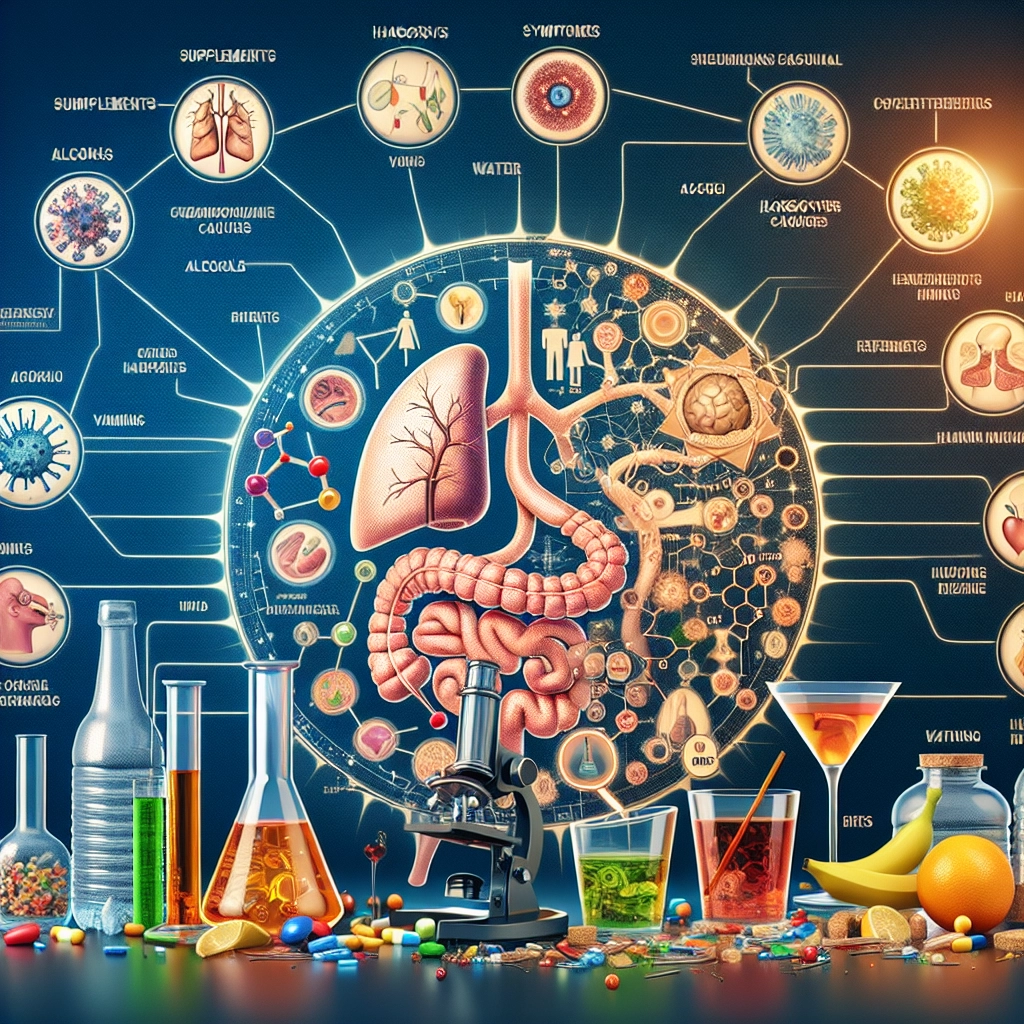
- Published on
- Authors

- Name
- ric de yuga 😄
🌟 The Science of Hangovers: Understanding the Causes and Effective Supplements for Prevention
We've all been there – the morning after a night of indulgence, feeling the unpleasant effects of a hangover. The pounding headache, the nausea, the fatigue – it's a reminder that our bodies are not designed to process excessive amounts of alcohol without consequences. But what exactly causes a hangover, and are there any effective supplements that can help minimize their impact? Let's dive into the science behind hangovers and explore some practical solutions for a more comfortable morning after.
🔬 The Complexity of Hangovers: A Multifaceted Phenomenon
Contrary to popular belief, hangovers are not solely caused by dehydration. While alcohol does have a diuretic effect, leading to increased urination and potential dehydration, the causes of hangovers are far more complex. In fact, hangovers are a result of a combination of factors, including:
Acetaldehyde Accumulation: When alcohol is metabolized in the liver, it is first converted into a toxic substance called acetaldehyde. If the body cannot process acetaldehyde quickly enough, it accumulates in the bloodstream, contributing to hangover symptoms.
Inflammatory Response: Alcohol triggers an inflammatory response in the body, leading to the release of cytokines – small proteins that can cause symptoms such as headaches, fatigue, and nausea.
Glutamine Rebound: Alcohol inhibits the production of glutamine, an amino acid that plays a role in brain function. When alcohol levels drop, the body overcompensates by producing excess glutamine, which can lead to sleep disturbances and anxiety.
Congeners: Congeners are byproducts of the alcohol fermentation process, and they are found in higher concentrations in dark liquors like whiskey and bourbon. These substances can contribute to the severity of hangover symptoms.
💊 Effective Supplements for Hangover Prevention and Relief
While there is no magic pill that can completely eliminate hangovers, certain supplements have shown promise in reducing their severity and aiding in recovery. Here are some effective supplements to consider:
N-Acetyl Cysteine (NAC): NAC is an amino acid that helps break down acetaldehyde, the toxic byproduct of alcohol metabolism. By supporting the liver's detoxification process, NAC can help alleviate hangover symptoms.
B Vitamins: Alcohol depletes the body's stores of B vitamins, particularly B1 (thiamine), B6, and B12. These vitamins play crucial roles in energy production, brain function, and the metabolism of alcohol. Supplementing with a B-complex vitamin can help replenish these essential nutrients.
Milk Thistle: Milk thistle is an herb known for its liver-protective properties. The active compound in milk thistle, silymarin, helps support liver function and may aid in the detoxification process, reducing hangover severity.
Electrolytes: Alcohol's diuretic effect can lead to the loss of essential electrolytes like sodium, potassium, and magnesium. Replenishing these electrolytes through supplements or electrolyte-rich beverages can help combat dehydration and associated hangover symptoms.
Ginger: Ginger has natural anti-inflammatory and anti-nausea properties. Supplementing with ginger or drinking ginger tea can help alleviate nausea and digestive discomfort associated with hangovers.
🍳 Lifestyle Strategies for Hangover Prevention
While supplements can be helpful in managing hangovers, the most effective approach to hangover prevention is adopting certain lifestyle strategies:
Moderation: The simplest way to avoid a hangover is to drink in moderation. Stick to the recommended guidelines of no more than one drink per day for women and two drinks per day for men.
Hydration: Drink water or other non-alcoholic beverages between alcoholic drinks to stay hydrated. Before going to bed, drink a glass of water to help counteract alcohol's diuretic effect.
Food: Eating a meal before or while drinking can slow down the absorption of alcohol, reducing its impact on the body. Opt for foods rich in protein and healthy fats to provide a protective lining in the stomach.
Sleep: Alcohol can disrupt sleep patterns, exacerbating hangover symptoms. Prioritize getting a good night's sleep to allow your body to recover and regenerate.
🌈 The Morning After: Embracing Self-Care
Despite our best efforts, sometimes hangovers are inevitable. When you find yourself in the throes of a hangover, prioritize self-care to aid in your recovery:
Rehydrate: Drink plenty of water, electrolyte-rich beverages, or herbal teas to replenish fluids and combat dehydration.
Nourish: Eat a balanced meal that includes protein, complex carbohydrates, and healthy fats to provide your body with the nutrients it needs to recover.
Rest: Allow yourself time to rest and recover. Engage in gentle activities like stretching, deep breathing, or a leisurely walk to promote circulation and reduce stress.
Time: Remember that hangovers are temporary, and your body will recover with time. Be patient and kind to yourself as you navigate the discomfort.
🌿 A Mindful Approach to Alcohol Consumption
While the science of hangovers is complex, the ultimate solution lies in a mindful approach to alcohol consumption. By understanding the causes of hangovers and implementing effective prevention strategies, we can minimize the negative impact of alcohol on our bodies and minds.
However, it's important to recognize that excessive alcohol consumption can have serious long-term health consequences. If you find yourself relying on supplements or struggling with frequent hangovers, it may be a sign to reassess your relationship with alcohol and seek professional support if needed.
🌈 Embracing Balance and Well-being
At the end of the day, the key to avoiding hangovers lies in embracing balance and prioritizing our overall well-being. By making informed choices, practicing moderation, and taking proactive steps to support our bodies, we can enjoy the pleasures of social drinking without compromising our health and vitality.
So, the next time you raise a glass, remember the science behind hangovers and the power of prevention. With the right supplements, lifestyle strategies, and a mindful approach, you can navigate the morning after with greater ease and resilience.
Here's to celebrating life's moments with joy, responsibility, and a commitment to our well-being. Cheers to a healthier, happier relationship with alcohol and the wisdom to make choices that align with our highest good. 🥂✨
Disclaimer: This blog post is for informational purposes only and does not constitute medical advice. Always consult with a qualified healthcare professional before starting any new supplement regimen or making significant changes to your alcohol consumption habits. If you suspect you have a problem with alcohol, seek professional help and support.
